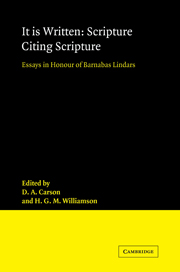Book contents
- Frontmatter
- Contents
- Preface
- Biographical note
- Abbreviations
- 1 An assessment of recent developments
- THE OLD TESTAMENT IN THE OLD TESTAMENT
- BETWEEN THE TESTAMENTS
- THE OLD TESTAMENT IN THE NEW TESTAMENT
- 11 Text form
- 12 Matthew
- 13 Mark
- 14 Luke/Acts
- 15 John and the Johannine Epistles
- 16 The Pauline literature
- 17 Hebrews
- 18 James, 1 and 2 Peter, Jude
- 19 Revelation
- Indexes
14 - Luke/Acts
Published online by Cambridge University Press: 16 January 2010
- Frontmatter
- Contents
- Preface
- Biographical note
- Abbreviations
- 1 An assessment of recent developments
- THE OLD TESTAMENT IN THE OLD TESTAMENT
- BETWEEN THE TESTAMENTS
- THE OLD TESTAMENT IN THE NEW TESTAMENT
- 11 Text form
- 12 Matthew
- 13 Mark
- 14 Luke/Acts
- 15 John and the Johannine Epistles
- 16 The Pauline literature
- 17 Hebrews
- 18 James, 1 and 2 Peter, Jude
- 19 Revelation
- Indexes
Summary
If the scope of this chapter is not carefully defined and the definition strictly observed it will far exceed the limitations of space imposed upon it. It is not intended to deal with the influence, whether literary or theological, of the OT upon the Lucan writings. This is profound and pervasive. It is safe to say that there is no major concept in the two books that does not to some extent reflect the beliefs and theological vocabulary of the OT; and it is a familiar fact that Luke's style often (though by no means always) bears a Semitic stamp which suggests to some (notably Torrey) that he is translating Hebrew or Aramaic sources and to others (e.g. Sparks) that he deliberately imitated the style of the LXX. To explore these phenomena, interesting as it would be, does not fall within the range of this essay. It is arguable that references to OT characters, such as Abel or Lot's wife, are specific enough to be included among citations, but they will have to be set aside in the interests of what may legitimately be described as Scripture citing Scripture, that is, of passages where an Old Testament text is introduced by a citation formula and quoted literally (though not necessarily of course in complete agreement with any form of the OT text otherwise known to us). Such citations imply beliefs about the authority of the text cited, and play a different part in argument and exposition from that which allusions, however clear and in their own way weighty, can play.
- Type
- Chapter
- Information
- It Is Written: Scripture Citing ScriptureEssays in Honour of Barnabas Lindars, SSF, pp. 231 - 244Publisher: Cambridge University PressPrint publication year: 1988



